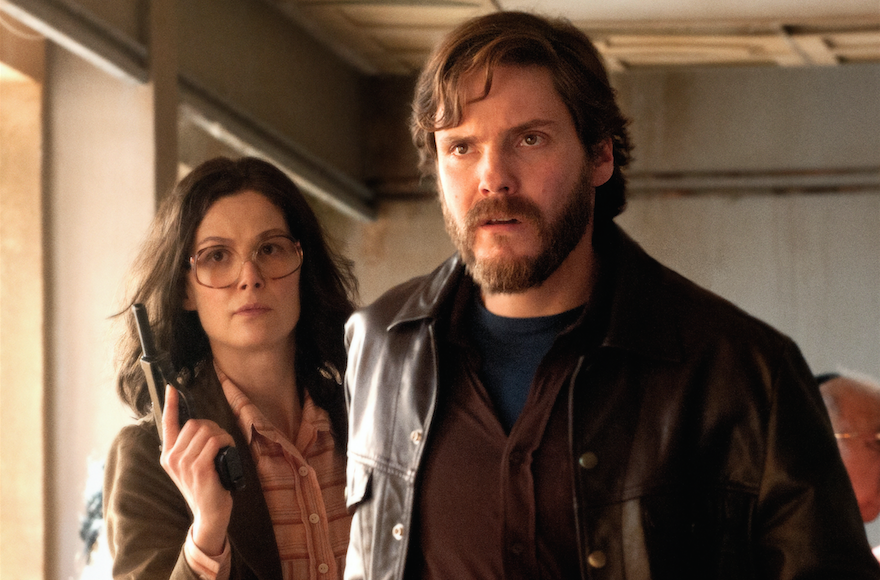(JTA) – In “7 Days in Entebbe,” which hits theaters on Friday, Daniel Bruhl plays a German leftist terrorist tortured by the fact that he’s hijacking a plane full of Jews and taking them prisoner.
The movie, about the 1976 Israeli rescue operation that freed the mainly Jewish and Israeli hostages of a hijacked plane in Uganda, focuses on the conflicted experiences of the two Germans – played by Bruhl and Rosamund Pike — who allied with Palestinian terrorists to hijack the Paris-bound plane. Even as they hold Jews at gunpoint, the two insist they are “humanitarian” activists fighting against fascism. But the parallels to their German forebears are clear.
“Germans killing Jews,” an associate of his says. “Ever thought about that?” At another point, Bruhl’s character, Wilfred Bose, insists, “I’m no Nazi.”
Bruhl, 39, who was born in Spain and grew up in Germany, had his breakout role in the 2003 film “Goodbye, Lenin!” about East Germany at the end of the Cold War, and met American audiences six years later playing a Nazi war hero in Quentin Tarantino’s “Inglourious Basterds.” Although he has played the Gilded Age criminal psychologist Lazlo Kreizler in the TNT series “The Alienist” and an investigative journalist who recovers World War II-era art in “Woman in Gold,” in five different films he has been called on to play Nazis, a civil servant under the Nazis or a supervillain from a Nazi family.
The multiplicity of such roles, Bruhl said, is a natural consequence of being a German actor in an industry that keeps churning out World War II movies. But it also has to do with his interest in historical events. In addition to films about World War II, the Entebbe raid and the fall of the Berlin Wall, Bruhl was in “The Carpenter’s Pencil,” about the Spanish Civil War, as well as dramas set in Franco’s Spain and 1970s Chile. His mother is Spanish.
In “Entebbe,” he plays a German bad guy grappling with his country’s recent history. And in an interview with JTA, Bruhl made clear that he doesn’t want such roles to define him.
“I’ve done so many different things,” he said. “Looking back, there’s a body of work which is very diverse. Fortunately, I can say I’ve done many different things. I wouldn’t have liked to be typecast and limited to that. When I decided to take these parts it was always out of an interest in period projects, in history.”

Bruhl, left, was introduced to a broad American audience in “Inglorious Basterds.” He’s shown here in 2009 with co-star Brad Pitt. (Pascal Le Segretain/Getty Images)
“I’m always interested in history,” he added. “It’s important to read about history, to analyze history, to also understand where we are right now. I’m not Swedish or Finnish, or I’m not from India, so being a German-Spanish actor, of course I’m participating in projects that deal with the history of my countries… I want to understand where I come from. This is what drives me.”
Bruhl does historical research to prepare for those roles. For “Inglourious Basterds,” a revenge fantasy that cared little for historical accuracy (the movie has – spoiler alert! – a Jew machine-gunning Hitler in the face in 1944), Bruhl took courses with a sniper. For “The Zookeeper’s Wife,” a Holocaust drama based on a true story, he and co-star Jessica Chastain met with the titular zookeeper’s daughter.
And for “Entebbe,” Bruhl read up on the German far-left activists of the 1960s and 1970s, including Revolutionary Cells, the urban terrorist group that conducted the Entebbe hijacking. He also met with survivors of the raid. The period when the hijacking happened resonates for Bruhl, who was born two years later and heard his parents talking about the leftist groups.
“I just wanted to go back in time and dig a little bit further and get into the mindset of a person who was taking the decision to not only be politically active, but to go that extra step and be a radical and join a mission in which a left-wing German terrorist is hijacking a plane with Jewish passengers,” he said. “It’s still so unbelievable. That made me curious to do some more research.”
“7 Days in Entebbe,” directed by Brazilian José Padilha, departs from the traditional narrative of Entebbe that’s been enshrined in Israeli lore. “Operation Thunderbolt,” the 1977 movie about the operation, tells a heroic saga starring Israeli soldiers. In that movie, and in the Israeli popular imagination, the hero is Yoni Netanyahu, the brother of the current Israeli prime minister, who was killed in the raid.

Lior Ashkenazi, right, as Yitzhak Rabin in “7 Days in Entebbe.” (Liam Daniel/Focus Features)
But “Entebbe” alternates mainly between the hijackers and an Israeli political drama centered on Yitzhak Rabin and Shimon Peres, who at the time were prime minister and defense minister, respectively. Much of the dialogue between Peres and Rabin, who is played by Israeli A-lister Lior Ashkenazi, is a heavy-handed discourse – performed in heavily accented English – on the need to negotiate for peace. The end credits trace the two men’s lives after 1976 and note that the peace process is inactive now – as if to draw a comparison between a hostage negotiation with a terror group and final-status talks between two recognized governments.
The part that does feature the Israeli army’s rescuers focuses on an ambivalent soldier and his girlfriend, a dancer whose performances are, for some reason, interspersed with scenes of the raid. (The choreography is by famed Israeli choreographer Ohad Naharin.) Yoni Netanyahu plays a bit role in this version and is unceremoniously killed as the operation is beginning.
The movie is most engaging as it explores the dilemmas of the Bruhl and Pike characters, whose dynamic – conflicted man and zealous woman on a violent ideological mission – is familiar to any fan of “The Americans.” The movie humanizes them, telling their backstories, showing how they were trained and, ultimately, how they break down during the escalating hostage crisis. But it’s hardly ambiguous in judging them: They are villains in this story.
For Bruhl, that’s not a problem. As with much of his work, it’s another way to delve into history, however messy it may be.
“That ongoing conflict is important, especially for younger generations, to take a step back, and look at the ’70s, look at the situation back then,” he said. “It can help you understand the current situation a little bit better, to remind yourself of the positions of what historically, politically was behind such a mission. … To not show an easy black-and-white picture of the conflict.”
JTA has documented Jewish history in real-time for over a century. Keep our journalism strong by joining us in supporting independent, award-winning reporting.






